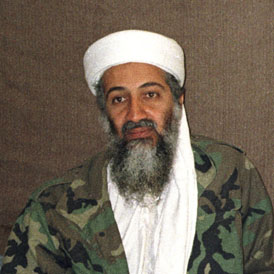Osama bin Laden: the hunt ends ten years on
As Osama bin Laden is killed by US special forces, defence analyst Anthony Tucker-Jones – who was part of the original team hunting the al-Qaeda leader – assesses the implications.

It is momentous news that – just short of the tenth anniversary of 9/11 – the world’s most wanted terrorist leader Osama bin Laden has finally been brought to justice. In Abbotabad, 60 miles north of Islamabad on 1 May 2011 he was cornered by US Special Forces and shot dead.
The method of bin Laden’s demise is in many ways disappointing, after all this time it is an anti-climax to what has been dubbed the “war on terror” – but perhaps as one would have expected.
For years after the fall of the Taliban and the ousting of al-Qaeda from Afghanistan, US Special Forces scoured the country for Bin Laden and his close cohorts, with one intention in mind: to gun him down.
Until now it had proved a fruitless task and the feeling was that perhaps he had died of natural causes. Ultimately, having located him, Washington had little option but to kill him on the spot.
Having located him, Washington had little option but to kill him on the spot.
Removing him to America or even Guantanamo Bay was never a practical option. Once incarcerated he would have remained a dangerous rallying point for every anti-Western Jihadist.
Clearly the operation to eliminate Bin Laden did not go entirely smoothly as a US helicopter came down near the Kakul Pakistan Military Academy (effectively Pakistan’s version of Britain’s Sandhurst and America’s West Point) and there was a fire fight before Bin Laden’s body was retrieved. He was reportedly killed in a compound near the Army Burn Hall College – a high school established during the period of British rule.
Questions will be raised over why he was hiding so near a key Pakistani military facility. US officials have said that Pakistan authorities were not notified of the raid in advance. Clearly it was felt there are leaks in the ISI (the Pakistani intelligence organisation).
Read more in our Special reports - War on Terror
“Charismatic though disorganised” was how Bin Laden’s late brother-in-law, Mohammed Jamal Khalifa, characterised him. Khalifa argued that Osama was a figurehead and stated that Bin Laden’s military commanders were the real power behind the throne.
On the basis of his backgound, it is hard to conceive of bin Laden as a true grand strategist – nonetheless there is no question over his complicity with 9/11.
Operation Enduring Freedom
As a former Defence Intelligence analyst I was closely involved in Operation Enduring Freedom in 2001 and the subsequent “war on terror”. At the time, the task of running Osama bin Laden, his right hand man Ayaman al-Zawahiri and Taliban leader Mullah Omar to ground in the mountains of Afghanistan seemed an all-but-impossible task.
Afghanistan was a haven of “who’s who” in the militant Islamist world and finding willing help for the fleeing al-Qaeda leader was never a problem While the Coalition air war went well, as did the Special Forces’ cooperation with the Northern Alliance, the botched battle of Tora Bora resulted in Bin Laden escaping – many argued that this had been facilitated by Pakistan. The sense of frustration and outrage within the Western intelligence community was palpable.
While it was generally agreed that he fled into Pakistan, intelligence also indicated that he had sought sanctuary near the Afghan-Iranian border or had made his way to Yemen.
Ever since, Pakistan has been accused of not pulling its weight in the war on terror at home and indeed abroad. In particular it is no secret that Pakistan’s ISI has competing loyalties and goals that are not always aligned with Western interests or even those of the Pakistani Government.
It is no secret that Pakistan’s ISI has competing loyalties and goals that are not always aligned with Western interests or even those of the Pakistani Government.
To make matters worse, there had been at least half a dozen opportunities to kill bin Laden since the late 1990s, but for varying reasons each was lost. It is quite remarkable that he managed to successfully elude the military and technological might of America for ten long years.
Tracking bin Laden down can only have been achieved through intelligence on the ground. Somebody somewhere tipped off Washington that he was in Abbotabad.
Khalifa claimed the West demonised Osama, turning him into an arch bogeyman. He also claimed that bin Laden took all the credit for Islamist exploits around the world. If this is true then he achieved his aim.
Inevitably some incarnation of al-Qaeda will live on, but whether it will be truly global is another matter. The environment in which terrorists now operate is vastly different to that of the 1990s.
As the dust settles, two questions are foremost in everyone’s minds. Firstly, how will al Qaeda’s surrogates react and where? Secondly, how was it that the world’s most wanted terrorist was able to live just 60 miles from the Pakistani capital.
Anthony Tucker-Jones is author of ‘The Rise of Militant Islam’ and a correspondent for Intersec – The Journal of International Security and defencemanagement.com